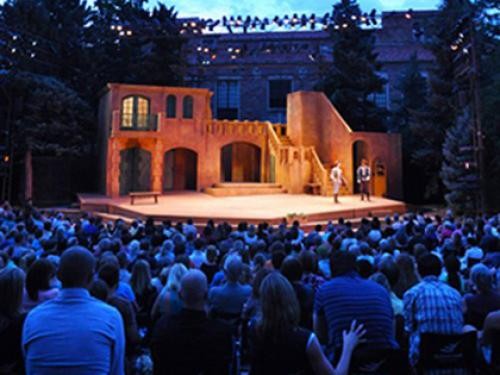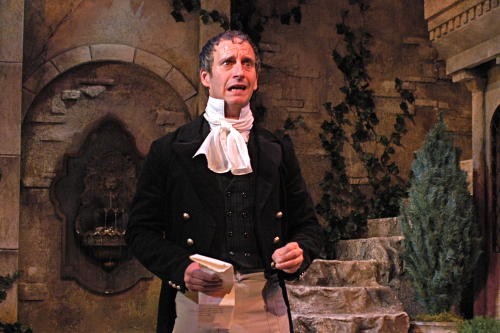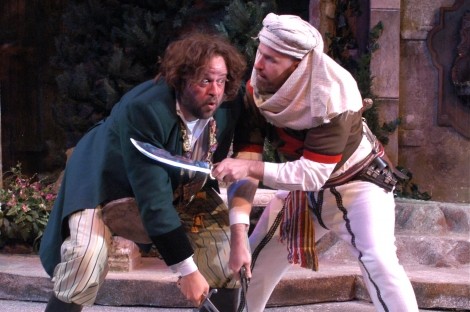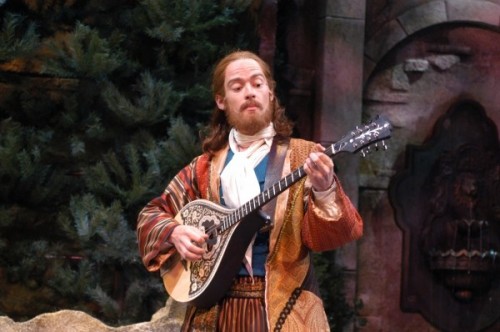Twelfth Night Enchants in Boulder
Colorado Shakespeare Festival Dissects Apollo and Dionysius
By: Susan Hall - Jun 22, 2012
Twelfth Night
By William Shakespeare
Directed by Philip Sneed
Colorado Shakespeare Festival
The Arvada Arts Center
Brian Malgrave Scenic Design
Clare Henkel Costume Design
Shannon McKinney Lighting Design
Steve Stevens Sound Design
Geoffrey Kent (Orsino), Josh Robinson (Sebastian), Stephen Weitz(Antonio), Logan Ernstthal (Sir Toby Belch), Ian Anderson (Sir Andrew Aguecheek), Timothy McCracken (Malvolio), Jamie Ann Romero (Fabian), Jake Walker (A Clown), Rachel Fowler (Olivia), Kate Berry (Viola), Leslie O’Carroll (Maria)
Mary Rippon Outdoor Theatre
Boulder, Colorado
June 16, 2012
Twelfth Night is the Colorado Shakespeare Festival’s opening 2012 production. Named for the last night of the Christmas, this religious holiday had more earthy origins, combining the spirited revelries of days like April Fool’s and Mardi Gras. Shakespeare captured the earlier spirit. Twelfth Night seemed just right for performance at an outdoor amphitheater cupped by the Rocky Mountains.
Philip Sneed directed with a charming sense of the touching and the ridiculous. As a hook to understanding the play, he offered a list of contrasts based on the Apollonian and Dionysian of ancient Greece. The characters may have taken the contrasts too much to heart, because the Dionysians dominated the evening.
Under the stars in Colorado, Brian Malgrave’s stage design took full advantage of the setting, suggesting both Turkey and Albania. The stage rises in front, wonderfully difficult to distinguish from the wall behind. The shape of a stage tree was picked up from a live one. Abounding details like this provided visual pleasure.
Twelfth Night is also a mashup of Upstairs/Downstairs and Downton Abbey. The characters under the stairwell are able to follow Tina Packer’s suggestion that "voices must be freed to speak their own truths, that language is the center of the theatrical experience and that language is rooted in the ideals of the Elizabethans: inquiry, passion, love, poetry, physical prowess, balance and harmony.”
Logan Ernstthal dove into Sir Toby Belch, the whimsical, madcap uncle of Olivia, full of antics, fond of sprees and wit. He bears a striking family resemblance to Falstaff. Played to the hilt, he is not mean-spirited, even though he loves cowardice in others. The first month of this production was designed for schools, where the bullying of Malvolio, by Sir Toby and others, was discussed.
Ian Andersen as Sir Andrew Aguecheek is a self-satisfied echo of Sir Toby, as both butt of his jokes and foil. Sir Toby cheats Sir Andrew out of his money, and pays him back with a promise of marrying Olivia. But Sir Andrew hardly seems wronged man, because the preposterous delusion that he will have Olivia makes him so happy.
Malvolio is madly in love with Olivia too. Playing the besotted prig, Timothy McCracken drives the Sir Toby group around the bend with his moral uprightness: he is only satisfied when he has the power to keep others from doing wrong.
Deliberately misled by the exuberant Leslie O’Carroll as Maria, the maid who is the apple of Sir Toby’s eye, Malvolio prepares to please Olivia. With too much conscience to mind his own business and too prudish to tolerate mirth in others, McCracken swells with self-love. Overweening moral foppishness is not the worst of crimes, but it is apt to provoke the merciless practical wit.
O’Carroll captures Maria’s keen eye and sure tongue to hit the mark. How she enjoys working to show the other rogues how witty she is: the model of arch, roguish mischievousness with to art to execute any plot. It’s her sport to see Malvolio “jet under his advanced plumes.” Yet when he is put away as a madman, we are moved by his plight.
The comedy and the romance of the play meet in Jake Walker's clown. He has a mirth complemented by delicate feeling, expressed in the song he sings: “The very sweetest Fancy culls and frames, Where tenderness of heart is strong and deep.“
These characters enliven Olivia’s home. Rachel Fowler's Olivia sways between a dignity befitting her class, and swooning over her cross-dressed love prospect, Viola.
In Viola a sweet consciousness of her feminine nature breaks through her masquerade. Kate Berry plays the part well, but never forgets, nor allows us to forget, that she is playing a part. People who do their best stitching in the embroidered web of friendship and fair society just aren’t as interesting as the devils. Geoffrey Kent is agreeable. When he articulates his great lines, enraptured by music, his performance escalates up.
Josh Robinson as Sebastian is only briefly on stage, but succeeds in revealing his character’s generous nature and good breeding. All the secondary characters are terrific.
There is a satisfaction at the end when almost everyone gets what they want. Free from the fascination with the darker problems of humanity, this kindly, genial piece may be perfect summer fare. “Eternal blessings on the Muse, And her divine employment;The blameless Muse who trains her sons For hope and calm enjoyment."
A modest charm of not too much. In Sneed’s hands the Packer approach to theater is fulfilled: “The transformative power of theater, based on humanity’s ever-present need to tell personal stories of survival and enlightenment.” Silly as mistaken identities may be, there are truths here. Packer herself arrives in Colorado on July 5 for Women of Will.






